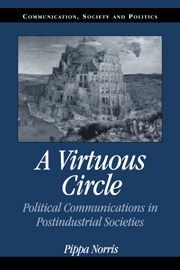14 - A Virtuous Circle?
Published online by Cambridge University Press: 26 February 2010
Summary
This final chapter highlights the major findings of this study and offers an alternative interpretation of the evidence whereby the process of political communication can be understood as a Virtuous circle’, a ratcheting process that over the long term gradually reinforces the activism of the active. This interpretation remains theoretical, for we lack direct proof, but it does make sense of the consistent patterns found throughout this study. The conclusion echoes an earlier era of political-communication research of the Columbia school, unfashionable in recent years, when the news media were widely believed to exert a positive force in democracy.
The media malaise theories discussed in this book claim that coverage of public affairs by the news media contributes to civic disengagement, including ignorance of public affairs, disenchantment with government, and political apathy. In understanding such accounts of media malaise, it helps to draw a clear distinction between the explanans and explanandum. Various authors agree about the effects of media malaise but differ regarding the reasons for that phenomenon.
The modern idea of media malaise originated with the Langs in the 1960s, developed with the work of Michael Robinson in the mid-1970s, and gained credibility as it was subsequently expanded, with variations on the theme, by several American and European scholars in the 1990s. That idea spread more widely because it fed a mood of self-doubt and angst in contemporary American journalism. In recent years, dissenting voices in the literature have been overwhelmed by the current popularity of media malaise theories. Many accounts imply a general pattern that, if true, should be evident across postindustrial societies.
- Type
- Chapter
- Information
- A Virtuous CirclePolitical Communications in Postindustrial Societies, pp. 309 - 320Publisher: Cambridge University PressPrint publication year: 2000
- 3
- Cited by



